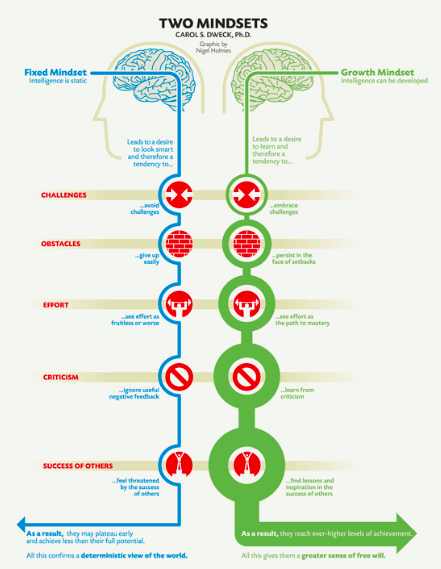"I can't do it" said the child.
"Try sounding it out, I'll help you" I replied.
"No I can't, I just can't, it's impossible" the child said, clearly defeated.
I was a part of this interaction when I was testing a child on their knowledge of sight words during my volunteer hours at a school. This child was very discouraged and did not want to try sounding out the words because she thought she did not know them. She was in grade four, and was already stuck in a fixed mindset. As her educator at that moment, I was lost for a strategy to help. This is when I became interested in children's motivation and how I can help them through these tough moments. However it was not until my current EDUC 4P17 class that I was given the knowledge about the two types of mindsets and how we can help encourage the optimal one in our students. I am now immersing myself in this concept and I will share with you what I am learning.
In the interaction above, a fixed mindset was demonstrated. A fixed mindset indicates that the student embodies success as something that is a result of innate qualities that cannot be changed (Drake, Reid & Kolohon, 2014). Students who have a fixed mindset will not attempt challenging tasks and put no effort into trying past what they think they can achieve. In contrast, students who have a growth mindset are optimistic of their effort in challenging situations, they see failure as only temporary and that they can persist through the failure with their effort as an opportunity to learn (Drake, Reid & Kolohon, 2014). This is where 'yet' comes into play; children with the growth mindset will say "I can't do this...YET" and will continue to pursue to higher levels of achievement than they would with a fixed mindset. A look at the picture below demonstrates the main differences between the fixed and growth mindsets.
 |
| Two Mindsets (2007) |
If the child I was working with had a growth mindset, she could have persisted through the 'failure' of not knowing the word and seen it as an opportunity to learn. I wish I would have known how to facilitate this with her. As a future educator, my goal is to promote a healthy growth mindset in my students so that each of them has the potential to fulfill their lives with rich and enhancing experiences. How am I going to do this? Carol Dweck, a pioneer in the psychology of motivation, helped me answer my question. After watching her TED Talk, The Power of Believing that You Can Improve, I learned that instead of praising talent or intelligence, we should be praising the process, effort, strategies and improvement that children use to get to an answer (Dweck, 2014). This will create children who have a growth mindset, who are resilient and have higher achievement rates.
Dweck also cited a study in which children who adopt a fixed mindset have very static brain activity whereas children who embody a growth mindset have brains that are fully active (Moser et al, 2011). This clear difference in brain activity is very astonishing, making it that much more important to encourage growth mindsets in children, and understand what is happening when children do adopt such strategies.
 |
| Moser, Schroder, Heeter, Moran & Lee (2011) |
I found a very interesting YouTube video, A School that Keeps Learning, that demonstrates a school actually putting the growth mindset into action. I love the approach they took in the school because the teachers not only pushed for the students to adopt this mindset, but they had the mindset themselves. This is very important because as educators, we need to model what we want our students to do and who we want our students to be.
Seeing as my certification is to teach Primary/Junior, it came to my attention that explaining the growth mindset to young students will be more challenging than older students. I found another YouTube video that will aid me in teaching my students about mindsets. This can become empowering for young students because they can see that Ormie persists through the challenge and never gives up, two identifying factors of a growth mindset.
Overall, the growth mindset is something that I deeply value and feel as if it is very important to adopt and share with my future students. Thanks for reading my first blog, I hope you enjoyed this information as much as I did!
Disney Shorts (2013)
Overall, the growth mindset is something that I deeply value and feel as if it is very important to adopt and share with my future students. Thanks for reading my first blog, I hope you enjoyed this information as much as I did!
"Let's not waste any more lives, because once we know that abilities are capable of such growth, it becomes a basic human right for children, all children, to live in places that create that growth, to live in places filled with yet" (Dweck, 2014)
References
Disney Shorts. (2013, October 18). Ormie [video file]. Retrieved from https://www.youtube.com/watch? v=xd63g3d8qOs
Drake, S. M., Reid, J.L. & Kolohon, W. (2014). Interweaving curriculum and classroom assessment: Engaging the 21st century learner. Toronto, ON: Oxford University Press.
Drake, S. M., Reid, J.L. & Kolohon, W. (2014). Interweaving curriculum and classroom assessment: Engaging the 21st century learner. Toronto, ON: Oxford University Press.
Dweck, C. (2014, November). The power of believing that you can improve [video file]. Retrieved from https://www.ted.com/talks/carol_dweck_the_power_of_believing_that_you_can_improve
Moser, J., Schroder, H., Heeter, C., Moran, T. & Lee, Y. (2011). Mind your errors: Evidence for a neural mechanism linking growth mind-set to adaptive posterror adjustments. Psychological Science, 22(12), 1484-1489.
Two Mindsets [online image]. (2007). Retrieved from URL (http://www.brainpickings.org/2014/01/29/carol-dweck-mindset/)

No comments:
Post a Comment